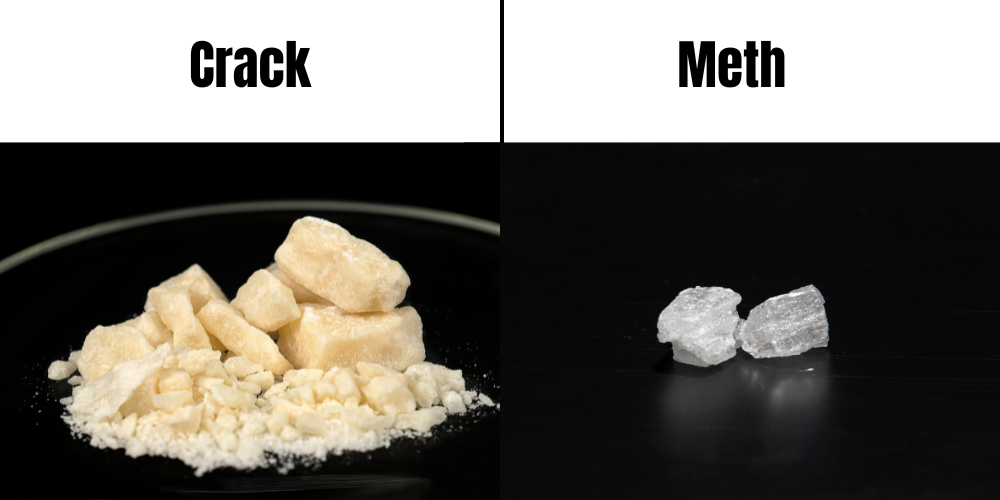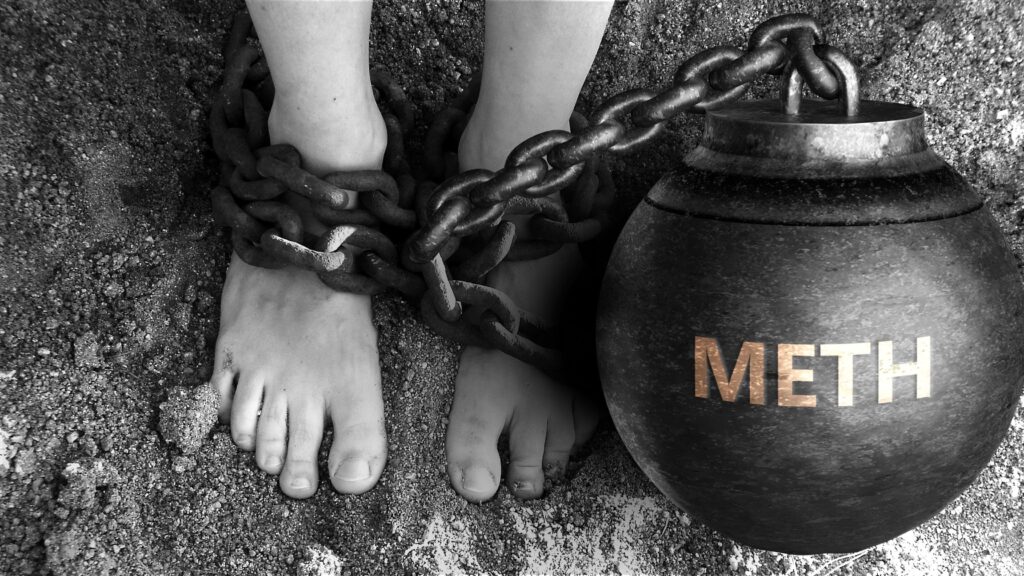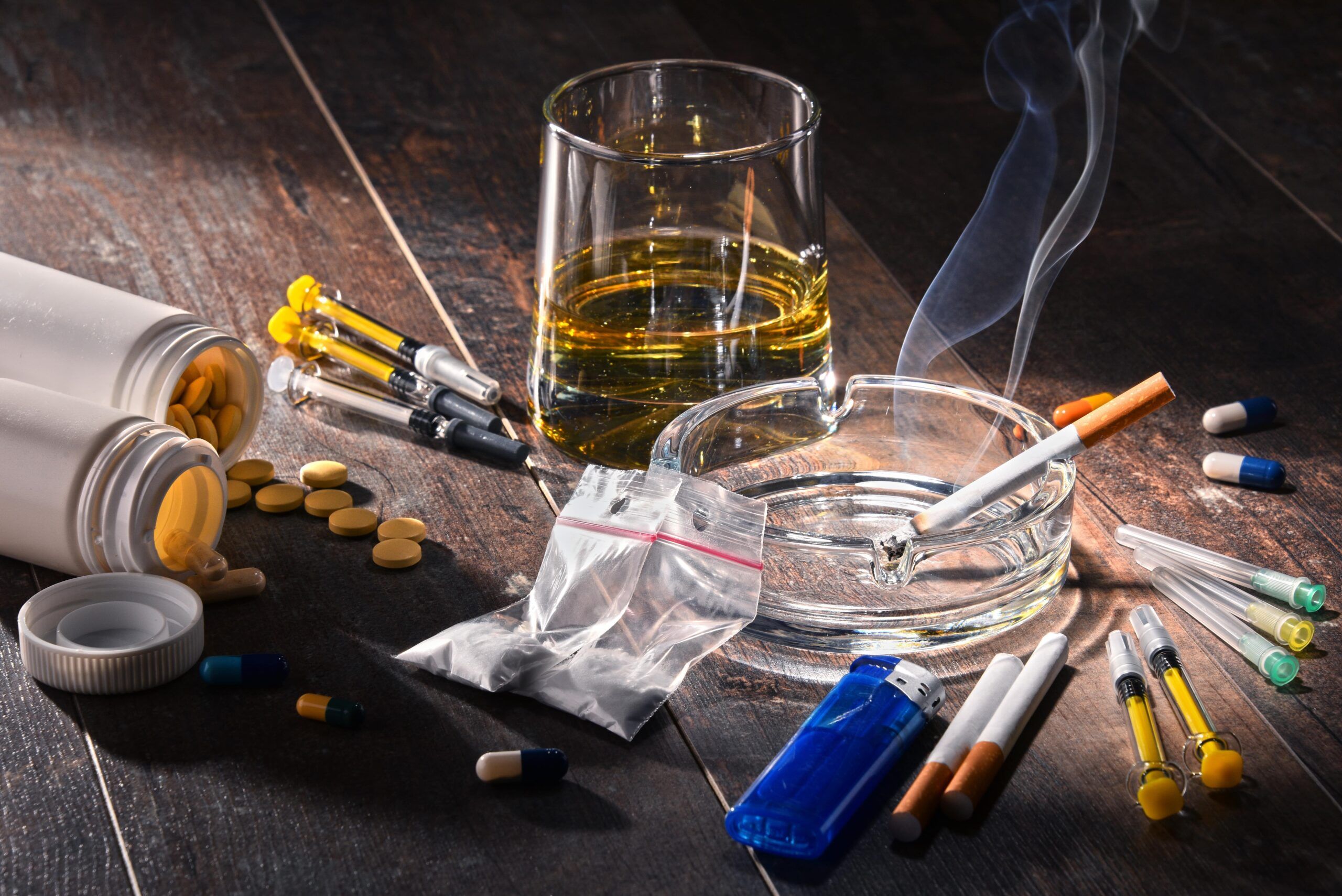Crack vs Meth: What are the Differences?
You are probably aware that crack and meth are powerful illegal drugs. But do you understand the similarities and differences between crack vs. meth? Increasing your knowledge of these dangerous substances can help you determine if someone that you know has been abusing them, so you can connect them with appropriate care before it’s too late.
What is Crack?
Crack is a version of cocaine. Instead of appearing as a white powder that can be snorted, crack is baked into small crystalline rocks that can be smoked. The term “crack” refers to the crackling sound these rocks make when they are heated.
Crack produces effects that are similar to powder cocaine. The primary differences between the two versions of the drug are that crack’s effects usually occur faster and become more intense, but they don’t last as long.
Crack use emerged as a serious public health threat in the 1980s. Though rates of crack abuse have declined since then, the drug has not disappeared. According to the Substance Abuse and Mental Health Services Administration (SAMHSA), about 996,000 people ages 12 and above in the United States used crack in the past 12 months.
What is Meth?
Meth is short for methamphetamine. It is sometimes referred to as crystal meth due to its appearance. Like crack, meth is a stimulant. This means that it speeds up the ability of neurons to send and receive messages throughout the central nervous system.
Meth can be ingested in several ways. As a crystal, it can be heated and smoked. It may also be crushed into a powder and snorted, dissolved into a solution and injected, or taken orally in pill form. There is no such thing as safe meth use, but injecting the drug may be particularly dangerous because it can expose a person to HIV/AIDS, hepatitis, and other bloodborne diseases.
The National Institute on Drug Abuse (NIDA) has reported that an estimated 2.5 million people ages 12 and above in the U.S. used meth in the previous year. NIDA has also reported that about 1.6 million people were addicted to meth in the past 12 months.

Crack vs Meth: Experience
Crack and meth are both stimulants. When someone uses either of these drugs, they are likely to experience effects such as:
- Euphoric rush
- Racing heart rate and increased blood pressure
- Elevated energy and self-confidence
- Heightened sensitivity to light, sound, and touch
- Loss of appetite and diminished need for sleep
In terms of a person’s experience when taking these drugs, one of the primary differences between crack vs. meth is the duration of their effects. When someone uses crack, the drug’s effects typically wear off in about 10-15 minutes. When a person ingests meth, the high may last for six to 12 hours.
Crack vs Meth: Addiction
In terms of addiction, there isn’t a significant difference between crack vs. meth. People who use either one of these drugs are at high risk of becoming addicted.
When the effects of these drugs wear off, they can be followed by a dramatic physical and psychological crash. To prevent this crash from occurring, people often use these drugs multiple times. For example, someone who is in the midst of a meth binge may stay up for several days in a row, taking meth every time they feel their stamina beginning to wane.
The more frequently a person uses crack or meth, the more likely they are to become dependent on it. Once a person has become addicted, it can be extremely difficult for them to end their crack or meth use without professional care.
Crack vs Meth: Dangers
Addiction is just one of many negative outcomes that can result from crack or meth abuse. The following is a quick comparison of the dangers of crack vs. meth.
Potential dangers of crack include:
- Diminished cognition
- Cardiovascular distress
- Liver and kidney damage
- Malnutrition
- Hallucinations and delusions
- Paranoia
- Delirium and psychosis
People who use meth for an extended period may incur the following types of harm:
- Severe dental decay
- Skin damage due to compulsive scratching and picking
- Aggressive and violent behaviors
- Auditory and visual hallucinations
- Altered brain structure and functioning
- Memory impairments
- Psychosis
Though there are a few differences between the dangers of crack vs. meth, it is no exaggeration to note that anyone who abuses either of these drugs exposes themselves to potentially catastrophic damage, up to and including death.
How is Crack Addiction vs. Meth Addiction Treated?
One important similarity between crack vs. meth is that addictions to either of these drugs can be treated.
The ideal course of treatment for someone who has become addicted to either crack or meth can be influenced by a variety of personal factors, including how long the person has been abusing the drug, how much they have been using, how their life has been affected by their addiction, and if they have any co-occurring mental health concerns.
Many people who have become dependent on crack or meth start their treatment experience with detoxification. Detox is a short-term program that helps people get through withdrawal safely and with minimal distress.
Following detox, a person’s treatment for crack or meth addiction may involve inpatient and/or outpatient care. Within these programs, they may take part is various therapies and support services to help them in the following ways:
- Replacing maladaptive thought and behavior patterns with healthier ways of thinking and acting
- Developing better stress-management and coping skills
- Identifying the triggers that could undermine their recovery
- Working on strategies for avoiding triggers or responding to them without resorting to substance abuse
- Beginning to repair relationships that were damaged by their addictive behaviors
- Sharing support with others who have had similar struggles and who are also working toward a healthier future
- Connecting with community-based resources that can offer long-term support
Contact Our Crack and Meth Addiction Treatment Center in Los Angeles, CA
If you or someone in your life has become addicted to crack or meth, Sanctuary Treatment Center can help. Our crack and meth addiction treatment center is a trusted source of life-affirming inpatient and outpatient care for adults in the Los Angeles area.
Our team of compassionate professionals works closely with each patient to determine the full scope of their mental and behavioral health needs, and we use these insights to develop customized plans to help our patients end their substance abuse and build a foundation for successful, long-term recovery.
We understand that every person who struggles with crack or meth addiction is impacted in a unique way, and we are committed to providing each patient with a truly individualized experience while they are in our care.
To learn more or to schedule a free assessment, please visit our Admissions page or call us today.















